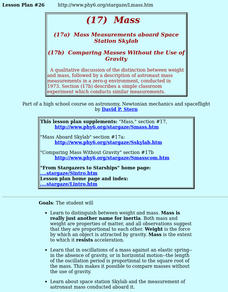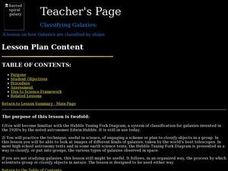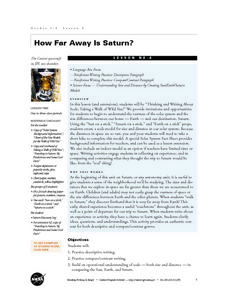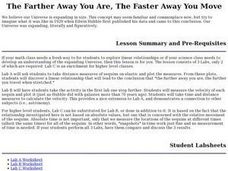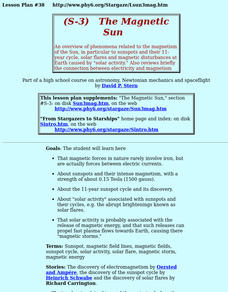Curated OER
Earth, Moon, Mars Balloons
Students demonstrate size and orbits of Earth, Moon, and Mars. In this space science lesson plan, students will use balloons to show how the size and distance between the planets and satellite compare.
Curated OER
Spaced Out
Pupils explore the transit of Venus and the information that this minieclipse provides about the distance between the Earth and the sun. They create their own astronomical units.
Curated OER
What on Earth is Greater Than?
Students compare things that are greater than, less than, or equal to, compare the Earth to other planets, and list planets from greatest size to smallest size.
Curated OER
Mass
Students participate in a qualitative discussion of the distinction between weight and mass, followed by a description of astronaut mass measurements in a zero-g environment.
Curated OER
Heating Up: Direct and Indirect Sunlight
Students, by conducting simulations, explore the effects of direct and indirect sunlight on heating of the Earth.
Curated OER
Classifying Galaxies
Young scholars classify galaxies by their shape using the Hubble Tuning Fork Diagram.
Curated OER
How Far Away Is Saturn?
Students work together to create a scale model of the solar system. They write a descriptive paper and a paper comparing and contrasting the Earth to Saturn. They discuss their writings with the class.
Curated OER
Ptolemy vs. Copernicus
Students list differences in the diagrams of a geocentric universe and a heliocentric universe. They students describe the religious impact of this change on man's conception of the universe and man's place within it. Students describe...
Curated OER
Coordinate Graphs
Students use coordinate graphs in order to identify objects and their locations. They are shown how to plot the x and y coordinates and then are given values to be plotted during guided and independent practice. Students are assessed on...
Curated OER
Stellar Lunar Curriculum
Learners engage in a lesson that covers the concept of different phases of the moon. They name the cycles of the phases of the moon while using flashlights to simulate the light of the sun. They research information about several...
Curated OER
The Farther Away You Are, The Faster Away You Move
High schoolers explore linear relationships. The lesson uses science to develop an understanding of the expanding Universe. There are 3 Labs, only 2 of which are required. Lab C is an enrichment for higher level classes.
Curated OER
Quiz: Name the Constellation
In this science worksheet, 3rd graders focus on the stars and constellations. Students respond to nine questions using written clues and visual aids.
Curated OER
Sun and Moon Poetry Baskets
Students write Sun and Moon poetry. In this poetry lesson, students research the sun and the moon. They write poetry and create two class baskets for descriptive words about each.
Curated OER
Solar System Bowl
Students make up questions in groups about the solar system and quiz the other group. In this solar system lesson plan, students demonstrate good cooperative learning techniques by reviewing the solar system together and quizzing each...
Curated OER
Planet Research and Brochure
Fourth graders design a brochure based on the planet that they researched. In this planets lesson plan, 4th graders include the data, important facts, and completed as a team.
Curated OER
Seeing Interference Fringes with a Telescope
Students construct an interferometer using a simple telescope. In this physics lesson, students explain how light waves create the fringe patterns. They observe patterns made by different objects in the sky and compare them.
Curated OER
Project SETI.
Tenth graders study how to search for life in outer space and make use of the 40-foot radio telescope at Greenbank, West Virginia. Request that the telescope be pointed at a particular location and time and receive data back from it...
Curated OER
Wisconsin Snapshots
Fourth graders study Wisconsin's culture and heritage. They research the state's symbols and identify leaves common to the Wisconsin area. They create a leaf booklet and visit the state park. They visit local farms and create nature maps...
Curated OER
Scoping Out Space
Students research existing and proposed telescope projects and synthesize their knowledge by creating presentations on each telescope and speculating about which project is worthy of additional funding.
Curated OER
Celestial Photography
Students practice photographic skills and gain an awareness of photography as a scientific tool.
Curated OER
The Planets Terra Firma
High schoolers explore the theories of the creation of the universe and examine the properties of celestial bodies. They analyze the relationship between the sun, Earth and the other planets.
Curated OER
Getting to Work and Making Money
Learners explain how geography and climate play a role in the professions that are unique to their city. They explain how geography and climate influence the forms of transportation in their city.
Curated OER
Persistence of Vision Tube
Students demonstrate how individual pieces of data combine to produce complete images.





